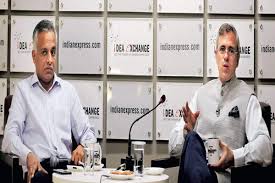
Seeking to break the party leadership’s silence on abrogation of Jammu and Kashmir’s special status and bifurcating the erstwhile state into two Union Territories, a senior National Conference (NC) leader has asked what is stopping his party and its leaders from expressing the NC’s “principled stand” on the issue.
While agreeing that the Centre’s response could be “ugly and brutal” if the party breaks its silence, former J&K minister Aga Roohullah asked his NC colleagues to be “ready for that”.
Roohullah told The Indian Express: “The National Conference has a known principled stand for the last 70 years: autonomy, (Article) 370 and the conditions of accession to India, Constitutional guarantees. All those were violated illegitimately on August 5 [last year, when special status to J&K was withdrawn].”He said the party does not need “permission from (New) Delhi” to express what happened on August 5, 2019.
“The only apprehension is, it may cause a backlash, in a sense that Delhi will respond in a very ugly (way); their response would be more brutal. But my point is, be ready for that. It is not all about rosy gardens. If you think the political process means only elections, (getting to) the Secretariat and chairs, we are misplaced. We are then not doing justice to our job, to our people.”
A religious cleric with hold among J&K’s Shia population, Roohullah is an important and influential NC leader and has been a three-time legislator.
He said the party has reasoned that it is silent on these issues because the NC working committee could not meet, as several of its members are detained under the Public Safety Act (PSA), or are detained at home.
Roohullah, also a member of the working committee, said: “They (party leaders) have their own reasons; they have their own justifications, to which I partially agree and partially do not. They give justification — they are my colleagues, and I do not separate myself from the party; my colleagues –– that unless they (working committee members) are released, and then meet and collectively decide, we should not speak, as it is the mandate of the working committee.”
Leave a Reply